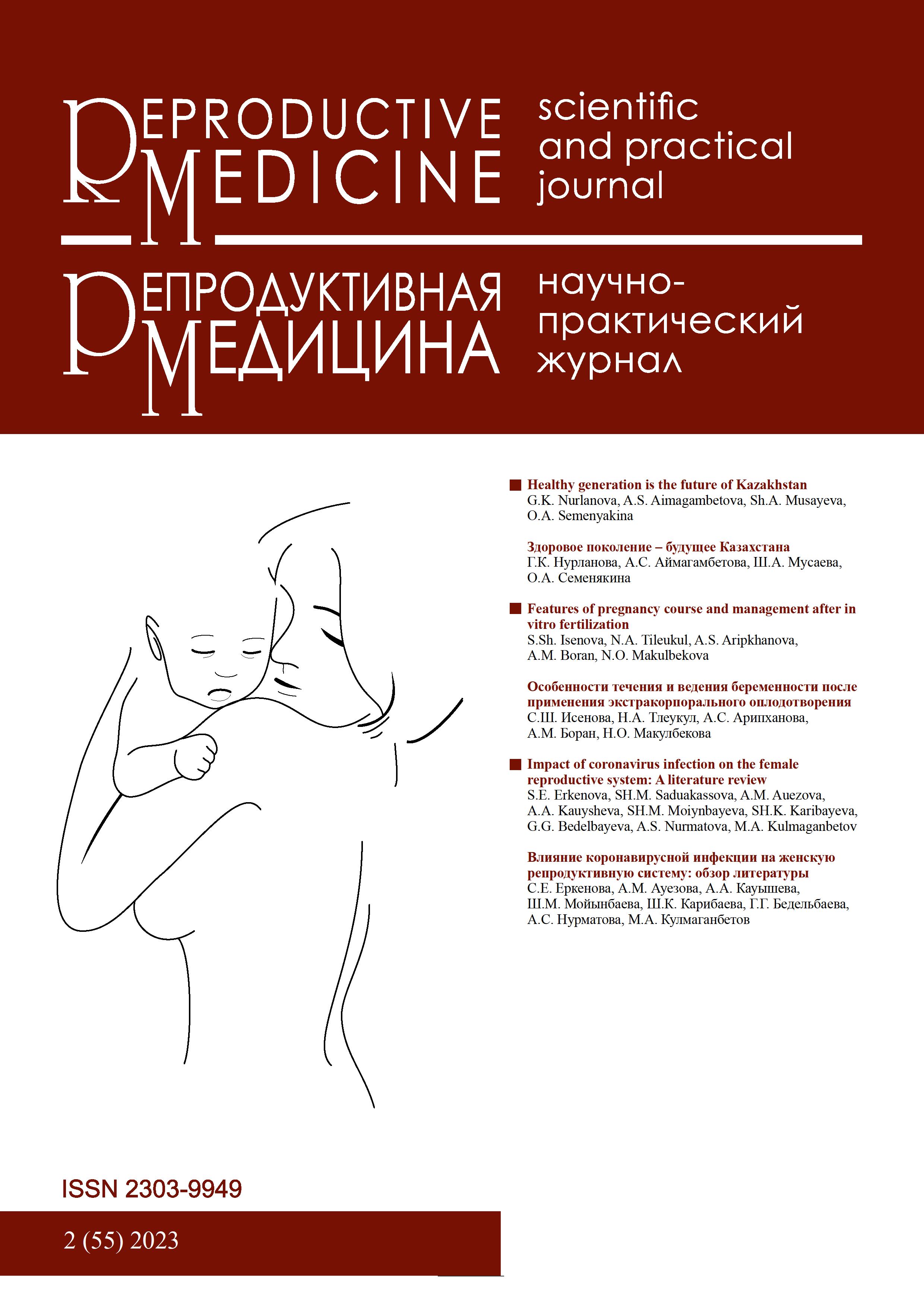Modern approaches to the treatment of pregnant women with a genetic predisposition to thrombophilia: A literature review
DOI:
https://doi.org/10.37800/RM.2.2023.60-67Keywords:
recurrent pregnancy loss, thrombophilia, heparin, pregnancy complications, low molecular weight heparins, anticoagulant therapyAbstract
Relevance: The prevalence of recurrent miscarriage is 1 to 5%. Since the etiology of this pathology is not completely known, the methods of diagnosis and treatment associated with managing these patients are limited. The attention of researchers is focused on an integrated approach to the study of genetic, endocrine, and immunological causes of hemostasis disorders and the treatment of these disorders, particularly thrombophilia since an association of this condition with an unfavorable pregnancy outcome has been established.
The study aimed to establish the prevalence of thrombophilia in women with recurrent miscarriages and to evaluate the effect of anticoagulant therapy by literature analysis.
Materials and Methods: The search strategy for publications included the search for literary sources on the research topic indexed in the e-Library, Pubmed, Web of Science, and Scopus databases. For this review, we studied publications published in English or Russian for the past decade, from 2013 to 2023. A total of 60 publications were analyzed, of which 34 articles corresponded to the purpose of the study.
Results: The literature review revealed evidence confirming the relationship between hereditary thrombophilia and obstetric complications. However, insufficient studies were made to identify markers of thrombophilia in patients with reproductive insufficiency. The features of managing pregnant women with genetically determined thrombophilias are considered.
The data of clinical studies of anticoagulant therapy in women with reproductive failure and hereditary thrombophilia are presented, the results of which suggest that anticoagulant drugs with aspirin can improve the outcome of pregnancy in patients with recurrent miscarriage and hereditary thrombophilia.
Conclusion. To date, there has been an insufficient number of studies aimed at identifying relevant markers of thrombophilia in patients with reproductive insufficiency. It is suggested that markers such as PS, AT, MTHFR, and FVL can be used to assess the propensity for thrombophilia in women with reproductive insufficiency. Although this issue remains debatable, the study results confirm that this group of patients should be evaluated for the possibility of using anticoagulants.
References
Diejomaoh M.F. Recurrent spontaneous miscarriage is still a challenging diagnostic and therapeutic quagmire // Med. Princ. Practice. – 2015. – Vol. 24. – P.38-55. https://doi.org/10.1159/000365973
Vomstein K., Aulitzky A., Strobel L., Bohlmann M., Feil K., Rudnik-Schöneborn S., Zschocke J., Toth B. Recurrent Spontaneous Miscarriage: a Comparison of International Guidelines // Geburtshilfe Frauenheilkd. – 2021. – Vol. 81 (7). – P. 769-779. https://doi.org/10.1055/a-1380-3657
Practice Committee of American Society for Reproductive Medicine: Definitions of infertility and recurrent pregnancy loss // Fertil. Steril. – 2020. – Vol. 113 (3). – P. 533-535. https://doi.org/10.1016/j.fertnstert.2019.11.025
Hennessy M., Dennehy R., Meaney S., Linehan L., Devane D., Rice R., O’Donoghue K. Clinical practice guidelines for recurrent miscarriage in high-income countries: a systematic review // RBMO. – 2021. – Vol. 42(6). – P. 1146-1171. https://doi.org/10.1016/j.rbmo.2021.02.014
ACOG Practice Bulletin No. 197: Inherited Thrombophilias in Pregnancy // Obstet. Gynecol. – 2018. – Vol. 132(1). – P. 18-34. https://doi.org/10.1097/AOG.0000000000002703
La X., Wang W., Zhang M., Liang L. Definition and Multiple Factors of Recurrent Spontaneous Abortion // Adv. Exp. Med. Biol. – 2021. – Vol. 1300. – P. 231-257. https://doi.org/10.1007/978-981-33-4187-6_11
Зубков Д., Тайжанова Д., Амирбекова Ж., Турдунова Г., Беспалова Н. Информативность скринингового обследования параметров коагуляции для прогнозирования раннего выкидыша: обзор литературы // Репрод. Мед. – 2022. – №4(53). – С. 55-62 [Zubkov D., Tajzhanova D., Amirbekova Zh., Turdunova G., Bespalova N. Informativnost' skriningovogo obsledovaniya parametrov koagulyacii dlya prognozirovaniya rannego vykidysha: obzor literatury // Reprod. Med. – 2022. – №4(53). – S. 55-62 (in Russ.)]. https://doi.org/10.37800/RM.3.2022.55-62
Pritchard A.M., Hendrix P.W., Paidas M.J. Hereditary Thrombophilia and Recurrent Pregnancy Loss // Clin. Obstet. Gynecol. – 2016. – Vol. 59 (3). – P. 487-497. https://doi.org/10.1097/GRF.0000000000000226
Kamali M., Hantoushzadeh S., Borna S., Neamatzadeh H., Mazaheri M., Noori-Shadkam M., Haghighi F. Association between thrombophilic genes polymorphisms and recurrent pregnancy loss susceptibility in the Iranian population: A systematic review and meta-analysis // Iran Biomed. J. – 2018. – Vol. 22 (2). – P. 78-89. https://doi.org/10.22034/ibj.22.2.78
Skeith L., Carrier M., Kaaja R.A. A meta-analysis of low-molecular-weight heparin to prevent pregnancy loss in women with inherited thrombophilia // Blood. – 2016. – Vol. 127. – P. 1650-1655. https://doi.org/10.1182/blood-2015-12-626739
Sergi C., Al Jishi T., Walker M. Factor V Leiden mutation in women with early recurrent pregnancy loss: A meta-analysis and systematic review of the causal association // Arch. Gynecol. Obstet. – 2015. – Vol. 291. – P. 671-679. https://doi.org/10.1007/s00404-014-3443-x
Chen H., Nie S., Lu M. Association between Plasminogen activator inhibitor-1(PAI-1) gene polymorphism and recurrent pregnancy loss: A systematic review and meta-analysis // Am. J. Reprod. Immunol. – 2015. – Vol. 73. – P. 292-230. https://doi.org/10.1111/aji.12321
Arachchillage D.R.J., Makris M. Inherited Thrombophilia and Pregnancy Complications: Should We Test? // Semin. Thrombos. Hemost. – 2019. – Vol. 45 (1). – P. 50-60. https://doi.org/10.1055/s-0038-1657782
Liu X., Qiu Y., Yu E.D., Xiang S., Meng R., Niu K.F., Zhu H. Comparison of therapeutic interventions for recurrent pregnancy loss in association with antiphospholipid syndrome: A systematic review and network meta-analysis // Am. J. Reprod. Immunol. – 2020. – Vol. 83 (4). – Art. no. 13219. https://doi.org/10.1111/aji.13219
Stevens S.M., Woller S.C., Bauer K.A., Kasthuri R., Cushman M., Streiff M., Lim W., Douketis J.D. Guidance for the evaluation and treatment of hereditary and acquired thrombophilia // J. Thromb. Thrombolysis. – 2016. – Vol. 41 (1). – P. 154-164. https://doi.org/10.1007/s11239-015-1316-1
Leaf R.K., Connors J.M. The Role of Anticoagulants in the Prevention of Pregnancy Complications // Clini. Appl. Thrombosis/Hemostasis. – 2017. – Vol. 23 (2). – P. 116-123. https://doi.org/10.1177/1076029615615972
Papadakis E., Pouliakis A., Aktypi Α., Christoforidou A., Kotsi P., Αnagnostou G., Foifa A., Grouzi E. Low molecular weight heparins use in pregnancy: a practice survey from Greece and a review of the literature // Thromb. J. – 2019. – Vol. 17. – Art. no. 23. https://doi.org/10.1186/s12959-019-0213-9
Wu X., Yang K., Tang X., Sa Y., Zhou R., Liu J., Luo Y., Tang W. Folate metabolism gene polymorphisms MTHFR C677T and A1298C and risk for preeclampsia: a meta-analysis // J. Assist. Reprod. Genet. – 2015. – Vol. 32 (5). – P. 797-805. https://doi.org/10.1007/s10815-014-0408-8
Dugalic S., Petronijevic M., Stefanovic A., Stefanovic K., Perovic M., Pantic I., Vrzic Petronijevic S., Stanisavljevic D., Zaric M. Perinatal complications related to inherited thrombophilia: review of evidence in different regions of the world // J. Matern. Fetal Neonatal. Med. – 2021. – Vol. 34(15). – P. 2567-2576. https://doi.org/10.1080/14767058.2019.1669017
Hwang K.R., Choi Y.M., Kim J.J., Lee S.K., Yang K.M., Paik E.C., Jeong H.J., Jun J.K., Yoon S.H., Hong M.A. Methylenetetrahydrofolate Reductase Polymorphisms and Risk of Recurrent Pregnancy Loss: a Case-Control Study // J. Korean Med. Sci. – 2017. – Vol. 32(12). – P. 2029-2034. https://doi.org/10.3346/jkms.2017.32.12.2029
Rodger M.A., Carrier M., Le Gal G., Martinelli I., Perna A., Rey E., de Vries J.I., Gris J.C. Meta-analysis of low-molecular-weight heparin to prevent recurrent placenta-mediated pregnancy complications // Blood. – 2014. – Vol. 123 (6). – P. 822-828. https://doi.org/10.1182/blood-2013-01-478958
Rodger M.A., Gris J.C., de Vries J.I.P., Martinelli I., Rey É., Schleussner E., Middeldorp S., Kaaja R., Langlois N.J., Ramsay T., Mallick R., Bates S.M., Abheiden C.N.H., Perna A., Petroff D., de Jong P., van Hoorn M.E., Bezemer P.D., Mayhew A.D. Low-molecular-weight heparin and recurrent placentamediated pregnancy complications: a meta-analysis of individual patient data from randomised controlled trials // Lancet. – 2016. – Vol. 388 (10060). – P. 2629-2641. https://doi.org/10.1016/S0140-6736(16)31139-4
Hu X., Liang P., Diao L. The association of methylenetetrahydrofolate reductase gene mutation with unexplained recurrent miscarriage // Chin. J. Birth Health Hered. – 2014. – Vol. 11. – P. 87-89. https://www.semanticscholar.org/paper/The-association-of-methylenetetrahydrofolate-gene-Xiao-don/14a12f53f113644bcd9d4b5df0309a074b755d62
Al-Achkar W, Wafa A, Ammar S, Moassass F, Jarjour RA. Association of Methylenetetrahydrofolate Reductase C677T and A1298C Gene Polymorphisms With Recurrent Pregnancy Loss in Syrian Women. Reprod Sci. – 2017 – Vol. 24(9). – P. 1275-1279. https://doi.org/10.1177/1933719116682874
Elham Y., Mohammad T., Azra A. Methylenetetrahydrofolate reductase C677T and A1298C polymorphism in Iranian women with idiopathic recurrent pregnancy losses // Iran. Red. Crescent. Med. J. - 2014. - Vol.16(7). - P.16763. https://doi.org/10.5812/ircmj.16763.
Gi Su L., Joon C.P., Jeong H.R., Jong I.K. Etiologic characteristics and index pregnancy outcomes of recurrent pregnancy losses in Korean women // Obstet. Gynecol. Sci. – 2016. – Vol. 59 (5). – P. 379-387. https://doi.org/10.5468/ogs.2016.59.5.379
Huseynov, A.; Reinhardt, J.; Chandra, L.; Dürschmied, D.; Langer, H.F. Novel Aspects Targeting Platelets in Atherosclerotic Cardiovascular Disease—A Translational Perspective. Int. J. Mol. Sci. 2023, 24, 6280. https://doi.org/10.3390/ijms24076280.
Kim J.H., Lim K.M., Gwak H.S. New Anticoagulants for the Prevention and Treatment of Venous Thromboembolism // Biomol. Ther. (Seoul). – 2017. – Vol. 25 (5). – P. 461-470. https://doi.org/10.4062/biomolther.2016.271
Durrani J., Malik F., Ali N., Jafri S.I.M. To be or not to be: A case of heparin resistance // J. Community Hosp. Intern. Med. Perspect. – 2018. – Vol. 8(3). – P. 145-148. https://doi.org/10.1080/20009666.2018.1466599
Akhtar F., Wan X., Wu G., Kesse S., Wang S., He S. Low-Molecular-Weight Heparins: Reduced Size Particulate Systems for Improved Therapeutic Outcomes // Molecules. – 2018. – Vol. 23 (7). – Art. no. 1757. https://doi.org/10.3390/molecules23071757
de Jong P.G., Goddijn M., Middeldorp S. Antithrombotic therapy for pregnancy loss // Hum. Reprod. Upd. – 2013. – Vol. 19 (6). – P. 656-673. https://doi.org/10.1093/humupd/dmt019
Khalife D., Ghazeeri G. Recurrent Implantation Failure and Low Molecular Weight Heparin // Open J. Obstet. Gynecol. – 2018. – Vol. 8. – P. 146-162. https://doi.org/10.4236/ojog.2018.82018
De Jong P.G., Kaandorp S., Di Nisio M., Goddijn M., Middeldorp S. Aspirin and/or heparin for women with unexplained recurrent miscarriage with or without inherited thrombophilia // Cochrane Database Syst. Rev. – 2014. – Issue 7. – Art. No.: CD004734. https://doi.org/10.1002/14651858.cd004734.pub4
Nahas R., Saliba W., Elias A., Elias M. The Prevalence of Thrombophilia in Women With Recurrent Fetal Loss and Outcome of Anticoagulation Therapy for the Prevention of Miscarriages // Clin. Appl. Thromb. Hemost. – 2018. – Vol. 24(1). – P. 122-128. https://doi.org/10.1177/1076029616675967
Downloads
Published
How to Cite
Issue
Section
License
The articles published in this Journal are licensed under the CC BY-NC-ND 4.0 (Creative Commons Attribution – Non-Commercial – No Derivatives 4.0 International) license, which provides for their non-commercial use only. Under this license, users have the right to copy and distribute the material in copyright but are not permitted to modify or use it for commercial purposes. Full details on the licensing are available at https://creativecommons.org/licenses/by-nc-nd/4.0/.





